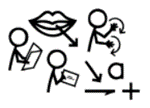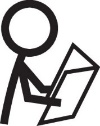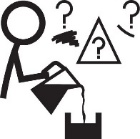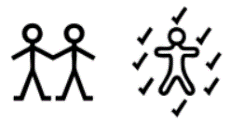Curriculum
We believe that the Clarendon Primary Centre should be a safe, nurturing and wonderful place where children want to be. We do not put ceilings on what pupils can achieve and we do not hold pre-conceptions about any pupils’ ability to make progress. Learning takes place both in and out of the classroom. Learning should be through a mixture of exploration, discovery, creativity and a variety of sensory and kinaesthetic experiences, to encourage a journey of lifelong learning and promote resilience and self-awareness. Pupils will develop the English and maths skills needed for life and to progress in their education. They will be encouraged to be curious and use thinking skills to innovate, be creative and problem-solve.
Our curriculum, which aims to be exciting and to inspire children to nurture a passion for learning, takes into consideration the mainstream subjects and expectations but has been developed around the special educational needs of our pupils. Communication, Life Skills, PSHE (personal, social and health education) and Physical Development form part of the core curriculum alongside English and maths. These are the areas we believe are fundamentally important for our pupils to ensure they develop the independence and personal skills to become lifelong, confident learners, ready for their next stage of education.
Our broad and balanced curriculum has been carefully designed and mapped out to ensure coverage and progression. The rolling plan of topics gives varied contexts for learning and provides children with a range of rich and memorable learning experiences. Cross-curricular planning allows pupils to revisit content and provides further opportunities for overlearning. Although we have whole school 'topics', the planning, learning and delivery will differ between classes. There will be variation in experiences / learning within a topic, always ensuring that the learning is developmentally appropriate for individual children.
The curriculum content echoes the ground covered by the Early Years Foundation Stage (2021) (since this framework is not confined to those below age 5, but rather, can extend right across the primary years within our setting), and an adapted National Curriculum key stage 1 and aspects of key stage 2. However, the personalised teaching approach reflects the age and learning style of the pupils concerned. Priorities based on IEP targets, Education, Health and Care Plans (EHCP) outcomes, pupils’ age, need, motivation and learning style help build the curriculum. All pupils across the Primary Centre have Individual Education Plans (IEPs) with targets based on the outcomes in their (EHCP). These are written and reviewed three times a year in consultation with parents and other professionals.
Many of our curriculum progression maps use the planning and assessment model advocated by the PSHE association. The six progressive stages enable us to break down learning outcomes into smaller steps, revisit, reinforce, consolidate and generalise previous learning, as well as introducing new concepts. The six stages are incorporated into our school assessment procedures so that we can monitor progress over time.
Communication 
At Clarendon Primary Centre, the Communication Curriculum underpins all of the other curricula taught. The school strongly believe that having good communication skills aids all aspects of life – from professional to personal and everything that falls in between; therefore, the ability to communicate effectively is perhaps the most important of all life skills. Our definition of communication is more than simply passing information to others (expressive language) and understanding what is said to us (receptive language), but also places emphasis on the importance of attention and listening, social skills and the role of play in developing our relationships with others. We aim for our children to be able to express needs and wants, accept and refuse, understand information, ask questions, form opinions and enable rewarding relationships through a total communication approach. Our total communication approach uses a range of modes of communication, both high and low tech, to enable all children to have a voice.
Communication is at the heart of everything we do. The curriculum includes frequent opportunities for the pupils to develop their communication skills, from being reactive to finding alternative ways to communicate with intent. Being able to communicate our thoughts and intentions and to be responded to in an appropriate way, is one of our basic human needs. For our pupils, however, there are many and varied barriers to being able to achieve this. The complex needs that many of our pupils face, means that they may not be able to develop language skills in the same way as a 'neuro-typically' developing child. Each individual's communication pathway will be unique. Pupils’ communication styles and preferences are assessed and developed, with help and guidance from the Speech and Language team, so that communicative opportunities can be maximised. Vocalisations, movements, gestures and other non-verbal methods of communication will always be acknowledged, as it is from here that pupils may be able to develop the building blocks for the future.
Life skills 
Our pupils need support in many areas of their lives; however, they need to be skilfully supported to be as independent as they can be. Independence is often understood as independence in self-care skills. These are, of course, valuable and desirable, but our first goal is to enable pupils to be independent in their play, actions and discoveries. Independence is the ability to take control in the circumstances of life and our environment. This is vital for our pupils, many of whom are likely to have limitations on their ability to be functionally independent in all areas of their lives. We need to ensure that our pupils do not develop 'learned helplessness'. The development of life skills is a primary aim in our curriculum as we aim to prepare our pupils for independent or semi-independent living. All pupils will access learning in the following areas: Cooking, Shopping, Personal safety, Personal hygiene, Road safety , Dressing skills, Social skills, Constructive use of leisure time and life skills maths related to money and time.
English 
English is a core subject and is at the heart of our curriculum. Through our English curriculum, we strive to teach our children how important their speaking, listening, reading and writing skills will be in the real world. Some of our pupils will need technology to communicate and to write. These children are taught the skills required to feel confident in using these devices so that they are not disadvantaged by their special needs. Careful links are made across the curriculum to ensure that children’s English learning is relevant and meaningful: where possible linking our reading and writing with our topics and life skills. The skills learnt as readers and writers will support independent living, the English content taught at Clarendon Secondary Centre and future employment.
Reading 
“Reading is the gateway skill that makes all other learning possible”. Barack Obama
“The more that you read, the more things you will know. The more you learn, the more places you’ll go.” Dr Seuss
We value reading as a key life skill, and are dedicated to enabling our pupils to become lifelong readers. We believe reading is key for academic success and we have a holistic approach to the teaching of reading.
We encourage all pupils to develop a love of reading so we read to pupils daily from a wide range of both fiction and non-fiction texts. This also develops their knowledge of themselves and the world in which they live and develops their vocabulary and comprehension skills.
We follow the ‘Letters and Sounds’ synthetic phonics programme, enhanced by cued articulation, to teach the skills to decode words. Alongside this, pupils learn to read the first 300 words and to use context and picture inference in order to be able to read fluently. These skills are taught through discrete lessons, shared and guided reading and one-to-one sessions.
Writing 
We ensure that children develop an understanding of how widely writing is used in everyday life and, therefore, how important and useful the skills are that they are learning.
Our intentions in writing are for children to:
- Write to inform (from learning to write their names and a simple shopping list, to a letter or biography)
- Write to entertain (a story, poem, description etc.)
- Write to persuade (advert, poster, letter etc.)
- Write for a variety of audiences and purposes
- See themselves as real writers
- Take ownership of their writing
- See writing as an interesting and enjoyable process
- Acquire the ability to organise and plan their written work
PSHE 
At Clarendon Primary Centre, the PSHE curriculum aims to support the growth of individuals who are able to live healthy, fulfilled lives, understanding and regulating their emotions, making informed choices, developing positive relationships and engaging in the world around them. Our curriculum uses a spiralling approach to support pupils to build upon existing skills to develop their understanding and engagement with the world in which they live. PSHE is taught as regular timetabled lessons as well as during incidental learning opportunities, which arise throughout the school day. The skills learnt will support individuals through their time at Clarendon Secondary Centre, out in the community and in future employment. Our curriculum is based on the PSHE Education Planning Framework for pupils with SEND (2020).
Maths 
The intent of our maths curriculum is to ensure that every child enjoys maths and becomes an enthusiastic mathematician. We do this by developing their skills, knowledge and understanding through practical experiences that have relevance and purpose in everyday situations. It is important that children develop the skills of numeracy to become lifelong learners. They should be able to apply these skills in different situations across the curriculum and in daily living outside school. It is essential that they understand the importance of maths in being able to function effectively in everyday life.
We want every child to make connections across mathematical concepts in order to develop their fluency, reasoning and problem-solving skills, and to be able to apply their mathematical knowledge in other curriculum areas.
We want to develop a numerate environment where mathematical risk-taking, creativity and logical thought are encouraged in order to develop independent learners. Manipulatives (objects that can be handled and moved e.g. cubes) are used to represent amounts and support pupils to visualise problems.
Our curriculum and schemes of work are designed to support a mastery approach to teaching and learning and incorporate the aims and objectives of the New EYFS and National Curriculum. We believe that small steps are easier to take and that all pupils can achieve if the building blocks are small. A mastery approach helps pupils memorise previous learning, creating connections to solve problems that are more complex. Teaching for mastery aims for all pupils to achieve with immediate interventions, so all pupils keep up and do not have to catch up!
Physical Development 
Our Physical Development curriculum provides far more than the DfE requirements for PE. Many of our pupils have physical challenges that need addressing in order for them to learn. For some children, there will be discreet sessions with physiotherapists or occupational therapists. However, we believe that wherever possible, physical development (gross and fine motor) should be integrated into our core curriculum. Significant time is given throughout the day for pupils to develop a wide range of physical skills to develop independence, to support sensory needs and to build self-esteem. All children participate in a daily active start, which provides cooperative opportunities for playing and sharing together. This was introduced in September 2017 because many of our pupils have a long journey to school and were not ready to learn when they arrived. Pupils are given time in the playground to join in playing games, running, cycling, climbing etc. This is followed by a shared breakfast that develops social and communication skills as well as practicing fine motor skills e.g. spreading butter and cutting toast. Alongside this, there are traditional PE lessons, weekly yoga and Forest school sessions. Support is provided to develop eating, dressing and other fine motor skills, and for sensory diets as appropriate.
Science 
At Clarendon Primary Centre, the science curriculum aims to support the development of scientists who, through an understanding of science, are able to gain interest from everyday activities, like taking a walk, cooking a meal or playing in the playground. Through developing a greater understanding of the world around them, individuals can respond with delight and wonder. Our curriculum encourages creativity, effective communication, creative thinking, the ability to ask and try to answer questions and a sense of awe and wonder. Children will learn how to ask questions and plan ways to find answers through observation, experimentation, classification and investigation. The skills learnt as a scientist will support independent living, the science content taught at Clarendon Secondary Centre and future employment. Our curriculum emphasises the importance of developing scientific enquiry skills and assumes that knowledge will be developed through investigation and enquiry. This curriculum has been developed from the content of the Early Years and Key Stage 1 programmes of study, with additional content from aspects of the Key Stage 2 curriculum. There are also links to the life skills curriculum and topics of interest to ensure a broad and balanced offer for our pupils.
Teaching of R.E. 
R.E. remains a statutory subject in Key Stages 1-4. Religious Education covers Christianity and other faiths. R.E. at Clarendon Primary Centre is included at an appropriate level and, in many classes will form an integrated part of the learning within a topic. The aim of religious education is not only to learn about different religions and faiths, but also to help the pupils understand cultural differences and similarities, and to promote greater respect and tolerance of others. We bring the classes together daily for assemblies, which are used as a time for thought, reflection and celebration. It is therefore regarded as a valuable teaching and learning opportunity. Whilst collective worship is broadly Christian in nature, it does also focus on other religious beliefs and festivals and reflects our diverse demographic. We strive for an atmosphere of trust and respect where pupils can examine, question and further develop their thinking.
Relationship, Sex and Health Education 
The aim of RSHE is to equip children and young people with the information, skills and values to have safe, fulfilling and enjoyable relationships, and to take responsibility for their health and wellbeing within an appropriate understanding of their current capabilities and needs. The school has a scheme of work to ensure that it meets the needs of all pupils as well as meeting its statutory obligations in relation to RSHE. Everyday emotional, relational and physical support will form an invaluable basis for RSHE provision, alongside regular discrete sessions that focus on specific topics and areas from the RSHE schemes of work.
Expressive Art and Design 
At Clarendon Primary Centre, we recognise that Expressive Art and Design (Art, Drama, Design Technology and Music) stimulates creativity and imagination. It provides visual, tactile and sensory experiences and a special way of understanding and responding to the world. Through a variety of carefully planned creative and practical activities, we aim to engage, motivate and inspire pupils to develop a love of art, design, drama and music, and to develop their skills to increase their self-confidence, creativity and sense of achievement. We also encourage children to explore ideas and meanings through the work of a range of artists, designers and musicians to develop an appreciation and enjoyment, which enriches their lives and promote lifelong interests in the Arts. Our curriculum aims to reflect the rich and varied culture and society that we live in, and so the teaching and learning enables children to understand better the world they live in.
Forest School 
Forest School provides an inspirational approach that offers all learners regular opportunities to achieve and develop confidence and self-esteem through hands-on learning experiences in a woodland or natural environment with trees. Children who struggle learning indoors are often enabled to develop new ways of learning and coping with the world.
The ethos of Forest School is based on a respect for children and their capacity to show initiative, investigate and maintain curiosity in the world around them. It champions a child's right to play; the right to access the outdoors (and in particular a woodland environment); the right to experience risk in a controlled way in the natural world along with the right to develop their emotional intelligence through social interaction, building a resilience to enable creative engagement with their peers and their potential.
A Forest School encourages children to:
- Develop personal and social skills
- Work through practical problems and challenges
- Learn how to manage failures and promote knowledge learnt through failure, seeing it as part of the journey to mastery
- Build confidence in decision making and evaluating risk
- Develop practical skills
- Regularly experience achievement and success
- Reflect on learning and experiences
- Develop their language and communication skills
- Improve physical motor skills
- Improve their concentration skills
Computing 
At Clarendon Primary Centre, we recognise that technology is an integral part of everyday life. The intent of our computing curriculum is to prepare our children for a future that is being increasingly transformed by technology. We encourage children to develop the skills, knowledge and confidence that they need to be able to become digitally literate. We do this through a combination of both cross-curricular and specific skills-based lessons. We recognise that children need to learn how to stay safe online and we develop this awareness regularly through our class lessons. When appropriate, touch-typing is taught to support writing skills.
Pupils are taught the skills required to apply Computing skills to real life problems and tasks and to support the ICT content taught at Clarendon Secondary Centre.
Understanding the world 
It is important that our pupils develop a sense of who they are, their heritage, what makes the local area unique and significant real events that have happened within the past. Our curriculum is designed to develop children’s curiosity and fascination about the world and its people that will remain with them for the rest of their lives. History and geography are taught as part of the whole school topic approach to give context for learning in the core curriculum. For example, writing an advert has purpose after a visit to Hampton Court.
